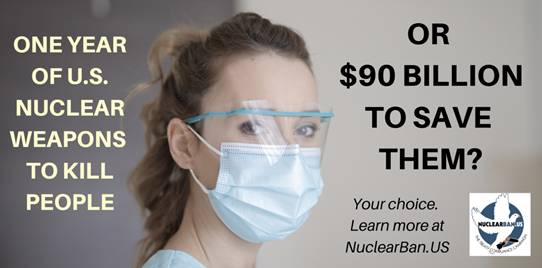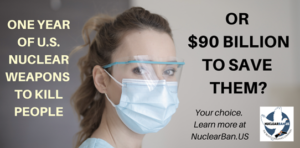
In a Pandemic, The Bomb Looks Different
Everything looks different through the lens of Covid-19.
If we can suddenly mobilize trillions of dollars to prop up the economy, why can’t we mobilize trillions to provide better food, shelter, and health care for our children? If we can stop polluting China’s air and Venice’s canals during a lockdown, why can’t we make that more normal?
If we can work so hard to cooperate globally to slow the pandemic and safeguard our future, then why on earth would we still possess nuclear weapons that can obliterate everything and everyone forever?
Pandemics, climate, inequality, nuclear weapons – of the four great problems threatening our very existence, one is very easy to solve, and this might just be the moment to cross it off the list.
To end the threat of nuclear weapons wiping us out by accident or by design, all we have to do is take the damn things apart.
Just take the warheads off their delivery systems: missiles, submarines, and airplanes. That’s it.
There’s nothing technical to figure out – the US and Russia have already dismantled 40,000 nuclear weapons since the end of the Cold War. But there are still nearly 14,000 of them, and these days they’re more accurate, swifter, and deadlier than ever.
They’re pointed at you and me, cruising around under the oceans, poised in silos, flying around on airplanes, or stockpiled. They’re costing an absolute fortune, and they’re keeping some of our best scientists too busy to work on more life-sustaining projects.
All that’s needed to end this 75-year-old nightmare is the political will. The groundwork for the disarmament process is already in place. The 2017 Treaty on the Prohibition of Nuclear Weapons (Nuclear Ban Treaty) lays out a framework for fair, well-coordinated, verifiable disarmament by all countries.
The rest of the world is outraged that nine nuclear-armed nations are holding the whole planet hostage.
Unlike previous treaties written (and repeatedly sidelined) by the offending nuclear nations, the Nuclear Ban Treaty was crafted by the rest of the world. It closes legal loopholes in prior treaties. Like chemical and biological weapons of mass destruction, nuclear weapons are now comprehensively banned under international law. The treaty makes everything to do with nuclear weapons illegal – even financing them, even threatening to use them.
The language of the Nuclear Ban Treaty was agreed by 122 (non-nuclear) countries at the United Nations. It has already been signed by 81 countries, ratified by 36 – and counting. It’s the best breakthrough you’ve never heard of.
Here in the nation that invented nuclear weapons (and has actually used them to slaughter civilians), humanitarian concerns are chipping away at decades of propaganda. You might want to ask your Congressional representatives to co-sponsor Norton HR 2419, which would require the USA to sign the Nuclear Ban Treaty and begin carefully negotiating disarmament with the rest of the world. Then, once the treaty is ratified, the bill requires us to shift the wasted money – and the squandered scientific talent – to a Green New Deal that addresses both climate and inequality. It can work, but not if we wait too much longer.
The Nuclear Ban Treaty won the Nobel Peace Prize for the team of young activists who facilitated it, the International Campaign to Abolish Nuclear Weapons (ICAN). In Oslo, the Prize was accepted by ICAN’s director, Beatrice Fihn, and Hiroshima survivor Setsuko Thurlow, who has campaigned for the end of the nuclear era since she crawled out of the rubble at age 13.
The bomb that wiped out Setsuko’s family, classmates, and city was small by today’s standards. Just one of the 14,000 modern bombs could cause unimaginable suffering and permanent destruction of people, ecosystems, infrastructure, and culture. A small, regional nuclear war (for example, between India and Pakistan) could kick enough soot into the atmosphere to block the sun, kill crops, and starve as many as 2 billion people.
“But,” many Americans ask, “if we disarm – won’t we be vulnerable to being attacked and overrun by Russia, China, North Korea, Iran?”
That’s a good question. But think about it: there are 185 non-nuclear-armed countries right now, and nobody’s overrunning them. Nobody’s nuking them, because nuke-owners know that nuking is suicide, even omnicide. Nuclear detonation would harm everyone: the nuker, the nukee, and innocent bystanders downwind — for generations, long after the original dispute is forgotten.
Nuclear “deterrence” is a concept that does not hold up to scrutiny. But even if this colossally lethal game of Chicken did make sense, would it be worth the risk? Nukes are not like conventional weapons – they are end-of-the-world machines.
Meanwhile, the danger of nuclear annihilation is heightened during a pandemic.
If you think it’s scary that your local health care providers might all get sick, what if the coronavirus hits the crew of a nuclear silo? Or a submarine?
Nuclear accidents happen all the time, and it’s pure luck that none have resulted in detonation so far. Nuclear war can be started by human error, mechanical malfunction, miscommunication, terrorist sabotage, or even a computer glitch. Over the years, we’ve had a dozen close calls besides the Cuban Missile Crisis. With the added chaos of a pandemic, the risk increases.
Anything that stresses our species, whether it’s a crisis of disease, water, food, politics, or weather, increases the likelihood of war, which can escalate until someone launches nuclear weapons on purpose. And someone else retaliates. Repeat until Game Over.
So why haven’t we disarmed already? It’s the same problem that Greta Thunberg points out about fossil fuels: “Our civilization is being sacrificed for the opportunity for a very small number of people to continue making enormous amounts of money.” You can follow the corporate money to political campaigns and the policies that ensue, just like with so many other issues that endanger, impoverish, and divide us.
This moment is a profound moral test for everyone.
This pandemic is laying bare our deepest values. Some are rising to the occasion with beautiful neighborly support and heroic action, from hospital staff to grocers. And some are descending to new depths of depravity, like those politicians who seem to have profited from insider knowledge of the coming crash, while publicly downplaying the danger.
We calculate that the USA is spending about $90 billion per year on nuclear weapons whose only function is annihilation. (One basic ventilator costs about $20,000. One Habitat for Humanity home costs about $90,000. One school lunch costs about $2.63.)
Our tolerance of nuclear weapons is the mother of all moral and humanitarian outrages. Nukes are the ultimate expression of dominance and oppression. They disproportionately affect women, the poor, the very young, and the unborn. The one time we actually used them against two Japanese cities, 75 years ago, was, in retrospect, a racist act. What kind of people do we want to be?
Imagine: The pandemic wakes us up to our shared fate.
We elect a sensible, peace-promoting President and Congress. Americans demand that our leaders sign and ratify the Nuclear Ban Treaty and work toward ratification. We realize that we can pay for a whole lot of solar panels and windmills – or a whole lot of ventilators and N95 respirators — for what we’re currently wasting on nuclear wars that, in Ronald Reagan’s words, “cannot be won and must never be fought.” We work together and support all nations in building sustainable systems.
We use the lessons we’re learning now to accelerate solutions to other shared crises. We realize that instead of an unfathomably bloated military budget, we can have a generous allocation of tax money that more than meets basic human needs for housing, nutrition, health care, and education. Even the wealthy benefit from a safer, healthier planet.
We continue to evolve. We get friendlier and more sensible, ready to face whatever challenge is next.
This pandemic’s silver lining, if there is one, might be that we humans continue to cooperate on a massive scale once it’s over.
The pandemic is showing us that anything is possible, good or bad, even that which seemed unthinkable just a short while ago. We’re working together globally to find solutions. We’re shaming those who behave selfishly. We’re learning fast. We’re being terrifically creative and altruistic.
It’s never been clearer: What happens in one country happens to everyone. It’s not “Us vs. Them.” It’s “Us vs. Disaster.” We can pull together, and we must.
Vicki Elson MA and Timmon Wallis PhD are ICAN partners and founders of NuclearBan.US, TreatyAwareness.US, and VoteToSurvive.org. Wallis is the author of Warheads to Windmills: How to Pay for a Green New Deal and Disarming the Nuclear Argument: The Truth About Nuclear Weapons.
Find this article online here:
http://www.nuclearban.us/in-a-pandemic-the-bomb-looks-different/

